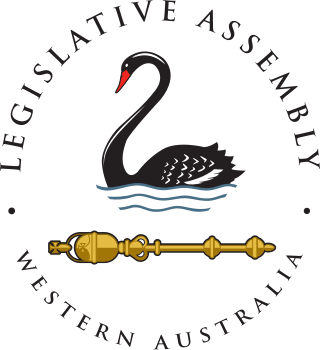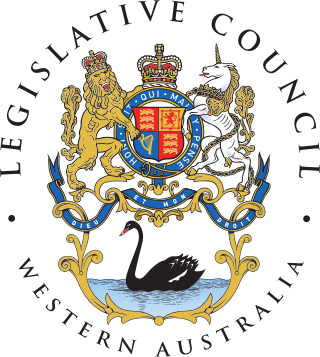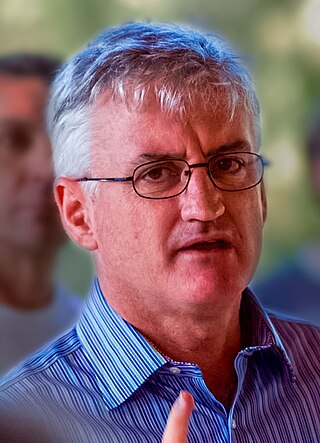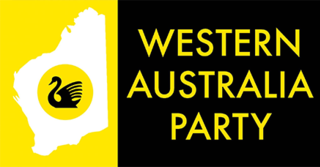
The Western Australian Legislative Assembly, or lower house, is one of the two chambers of the Parliament of Western Australia, an Australian state. The Parliament sits in Parliament House in the Western Australian capital, Perth.

The Australian Electoral Commission (AEC) is the independent statutory authority and agency of the Australian Government responsible for the management of federal Australian elections, by-elections and referendums.

Electorates of the Australian House of Representatives are single member electoral districts for the lower house of the Parliament of the Commonwealth. There are currently 151 electorates.

The Western Australian Legislative Council is the upper house of the Parliament of Western Australia, a state of Australia. It is regarded as a house of review for legislation passed by the Legislative Assembly, the lower house. The two Houses of Parliament sit in Parliament House in the state capital, Perth.

The Division of Canning is an Australian Electoral Division in Western Australia.

The Division of Hasluck is an electoral division of the Australian House of Representatives, located in Western Australia.
The Western Australian Legislative Assembly is elected from 59 single-member electoral districts. These districts are often referred to as electorates or seats.

Albany is a Legislative Assembly electorate in the state of Western Australia. Albany is named for the port and regional city of Western Australia which falls within its borders. It is one of the oldest electorates in Western Australia, with its first member having been elected in the inaugural 1890 elections of the Legislative Assembly. It is regarded as a swinging seat, and has been held by the Labor Party since the 2001 election, at which Peter Watson was first elected. Watson announced his retirement prior to the 2021 election and was succeeded in the seat by Labor Party colleague, Rebecca Stephens.

The Division of O'Connor is an Australian electoral division in the state of Western Australia. It is one of Western Australia's three rural seats, and one of the largest electoral constituencies in the world.
Legalise Cannabis Australia (LCA), also known as the Legalise Cannabis Party (LCP) and formerly the Help End Marijuana Prohibition (HEMP) Party, is a single-issue Australian political party. It has a number of policies that centre around the re-legalisation and regulation of cannabis for personal, medicinal and industrial uses in Australia.

The electoral district of Pilbara is a Legislative Assembly electorate in the state of Western Australia. Pilbara is named for the region of Western Australia in which it is located. It is one of the oldest electorates in Western Australia, with its first member having been elected to the Second Parliament of the Legislative Assembly at the 1894 elections.

The North Metropolitan Region is a multi-member electoral region of the Western Australian Legislative Council, located in the north-western and western suburbs of Perth. It was created by the Acts Amendment Act 1987, and became effective on 22 May 1989 with seven members who had been elected at the 1989 state election three months earlier. At the 2008 election, it was decreased to six members.
The lower houses of the parliaments of the states and territories of Australia are divided into electoral districts. Most electoral districts send a single member to a state or territory's parliament using the preferential method of voting. The area of a state electoral district is dependent upon the Electoral Acts in the various states and vary in area between them. At present, there are 409 state electoral districts in Australia.
The voting rights of Indigenous Australians became an issue from the mid-19th century, when responsible government was being granted to Britain's Australian colonies, and suffrage qualifications were being debated. The resolution of universal rights progressed into the mid-20th century.

The 2008 Western Australian state election was held on Saturday 6 September 2008 to elect 59 members to the Legislative Assembly and 36 members to the Legislative Council. The incumbent centre-left Labor Party government, in power since the 2001 election and led since 25 January 2006 by Premier Alan Carpenter, was defeated by the centre-right Liberal Party opposition, led by Opposition Leader Colin Barnett since 6 August 2008.

The Division of Durack is an Australian Electoral Division in the state of Western Australia.

The Australian Christians is a political party in Australia that is described as socially conservative and Christian-conservative. It was founded in 2011 and was registered by the Australian Electoral Commission on 15 December 2011. It is primarily active in Western Australia and contests both state and federal election, although it is yet to elect any representatives. The party aims to represent Christian values.

The Western Australia Party (WAP) was a regional political party active in Western Australia.

The 2021 Western Australian state election was held on Saturday, March 13, to elect members to the Parliament of Western Australia, where all 59 seats in the Legislative Assembly and all 36 seats in the Legislative Council were up for election.